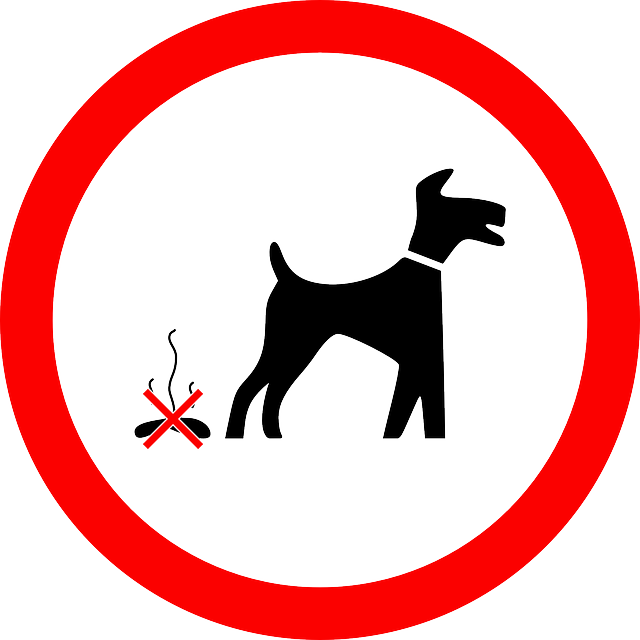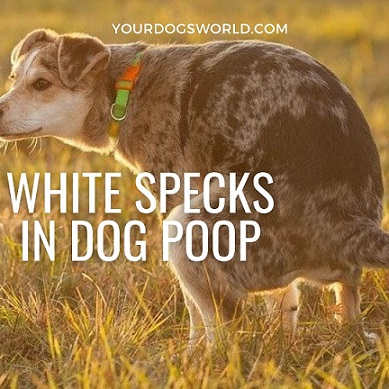Discussing your dog’s poop is not a pleasant conversation to have. But it is a conversation that you should not avoid. Dog poop holds vital information about dog health and certain parasitic invasions in his body.
White specks in dog poop can be a sign of serious health issues! They can be moving or non-moving. Finding the cause can save your dog’s life or stop him from suffering.
These white dots in dog stools can be an early warning sign that should not be ignored! The cost of ignorance could be your dog’s life.
Read this to find out How many times a day puppies poop.
What to do About White Specks in Dog Poop
Before tackling the problem of ‘dog poop with white specks’, you must find the cause! This condition has a number of causes. Sometimes it requires a visit to the vet and a stool sample.
Worms can be a common cause of white poop. In this case, deworming medication is the best step. But even then, a test must confirm it and a vet must prescribe the medication. Only use the prescribed dose.
How Long Will My Puppy Poop Worms After Deworming? – Read here
White specks caused by undigested food should not worry you. Instead, you can try to change the dog food brand. Also, do not offer your dog any human food as they cannot digest these items.
White Specks in Dog Poop- What Does it Mean?
Dog poop with white specks could mean a number of things. Don’t jump to conclusions quickly!
To pinpoint the exact reason you must take a close look. Sometimes even then a diagnostic test is mandatory.
The causes of white specks can be divided into two groups based on a simple question. “Are the white specks in dog poop moving or nonmoving?”
Moving White Specks in Dog Poop
If the white specks appear to be moving, it is likely they are a living organism. Worms and Fly larvae are the most common reason for these white areas in dog poop.
Worms
One dreaded reason behind white specks in dog poop is worms! There is only one place these worms came from- inside your dog. Worms can be harmful to both dogs and humans as they can survive once being pooped out.
A variety of worms exist that can use your dog as a host or vector. In total there are 5 worms that affect dogs and pass out in poop.
Hookworms
The Hookworm commonly uses cats and dogs as a host. These worms attach to the intestine and feed on your dog’s blood. When untreated, they can cause anemia.
Hundreds of eggs pass out in dog poop and contaminate the soil. They remain viable for months and can infect humans and dogs alike. These worms only measure an 1/8th of an inch and require a second look to be seen.
Hookworm diagnosis is done by the ‘fecal floatation’ test. In this test, Dog feces is mixed in a solution that will make eggs float to the surface.
Deworming medication can eradicate these worms. Immediate treatment kills the adults. After 2 to 4 weeks, another dose can kill off the remaining worms.
Roundworms
Another worm diagnosed by white strings in poop belonging to your canine companion is Roundworms.
Like hookworms, these worms are picked up by dogs from the soil or animal feces. Symptoms of this parasite include vomiting and diarrhea and it affects puppy growth.
This worm is a common one affecting dogs, rodents, rabbits, and birds. It can even affect humans! Luckily, a simple course of deworming medications can eliminate these pests.
This worm particularly affects puppies and can possibly cause death of puppies. Newly born puppies must receive care and medication to assure roundworms do not manifest in them.
Tapeworms
Tapeworms are much more severe than roundworms. Once ingested, tapeworms can feed on and destroy the intestines of dogs. They even use the inner lining of the intestine as a breeding ground for their eggs.
Dogs acquire tapeworms by eating infected animals/meat or consuming fleas (a good reason to control fleas).
Another sign of tapeworm infection is itchiness in his ‘rear’. If you see your dog dragging his bottoms on the ground, he may have a tapeworm infection
Tapeworm segments are visible in dog poop as tiny white rice-like specks. You can confirm their presence by testing the stool sample at the vet. A medication can be used orally or via injection to manage this infection.
Other Invisible Worms
Tapeworm, Roundworm, and Hookworm are visible worms in dog poop. But, two other worms may also be present.
They are microscopically small and hence are invisible to the naked eye. Their diagnosis needs better laboratory testing. Here are some details about these two worms.
Whipworm
The Whipworm works silently. In mild cases it is not detected. Severe whipworm infestations can have dire effects, some include:
- Diarrhea
- Weight loss
- Inflammation
- Anemia (occasionally)
To prevent these illnesses, proper hygiene and sanitation should be practiced. This mainly involves the correct elimination of dog poop.
Whipworm in dogs is picked up by a fecal test. Testing may produce a false positive meaning a second test should also be done.
Heartworms
The most notorious and dangerous worm is the Heartworm. Thankfully, it is also the most preventable parasitic infection! Heartworms use mosquitoes as vectors, so try to limit mosquito breeding around the house.
As the name suggests, heartworms grow and multiply in a dog’s heart. Effects include organ damage (lungs and heart), eventually leading to death.
Once infected, treatment is expensive and long. Survival is not guaranteed. Treatment can cause blood clots in the lungs.
This is one health issue that you do not want your dog to contract. Blood tests are the most common way to diagnose a heartworm infestation in dogs. Symptoms for this worm are mild with cough and tiredness.
Preventing heartworms is possible with several FDA-approved products on the market. Give them to your dog monthly. An assortment of pet friendly products like chewables or creams are available. This will be easier to give to a fussy dog.
Fly Larvae
Have you noticed white specks on dog poop that have been laying around for a short time?
Chances are that these could be maggot eggs. Flies often lay eggs on dog poop (or any poop)! This is because this moist organic matter acts as a nutrient-rich food for their newly hatched eggs.
This is not harmful to your dog since they are laid after your dog poops. However, you should remove the poop quickly as it can create a fly infestation in your garden.
Note, it takes just 24 hours for these fly eggs to hatch.

Non Moving White Specks in Dog Poop
White portions in dog poop may not be moving at all.
In this case, it is not a type of worm. So you might probably be thinking, “what else could it possibly be?”
Let us look at a few non-concerning reasons below:
Undigested Food Items
If you notice stationary white specks in your dog’s stool it might just be some undigested food item. A dog has a different stomach than humans and can’t digest everything we can.
Examples of these items include food that is solely meant for humans! Items such as rice are famous for passing out unchanged. Other ingredients are cereal grains like wheat, barley, etc.
Bones
An unfortunate feature of dog food is that most contain small amounts of bone. These bone pieces cannot be digested and pass out in their stools. This applies to all dog food, regardless of price or brand name. Luckily, these bone shards are harmless to your dog.
To avoid bone in dog poop, there is something you can do. You can switch to vegan dog food or make your own dog food. I would not personally recommend a vegan diet to a dog but that is an option.
Medications
A possible cause of white specks in dog waste is medication. Some dog medications come in the form of a capsule. Not all materials used to make these capsules are digestible by a dog’s system.
Therefore, it can pass out partially degraded and appears as a tiny white speck in poop. In this case, there is no need to fear the white dots in stools.
Unidentifiable Objects
Dogs that are curious could find themselves eating inedible items. Lego pieces, crayons, shoes, are some common items that dogs famously chew on. These items can find their way into dog poop.
FAQS
What are white seeds in dog poop?
White seeds in dog poop could be Tapeworms!
They are more likely if the ‘white seeds’ appear to be moving. Another sign of this parasite is if your dog drags his behind on the ground. You should confirm your doubt with a diagnostic test at the vet.
First, remember to dispose of the poop to avoid infecting the soil or other dogs. Tapeworms can be lethal in puppies but are treatable when caught in time. Tapeworm prevention in dogs revolves around garden hygiene and feces disposal.
What should I do if there are white specks in dog stool?
If there is no known reason for these white specs, step in closer for a better look.
Dog poop with white specks is enough to alarm any dog owner. If you cannot determine if they are moving or not, collect a sample. This sample can be taken to a vet and tested for worms.
What you SHOULD NOT DO is panic and self-diagnose the cause of the specks.

